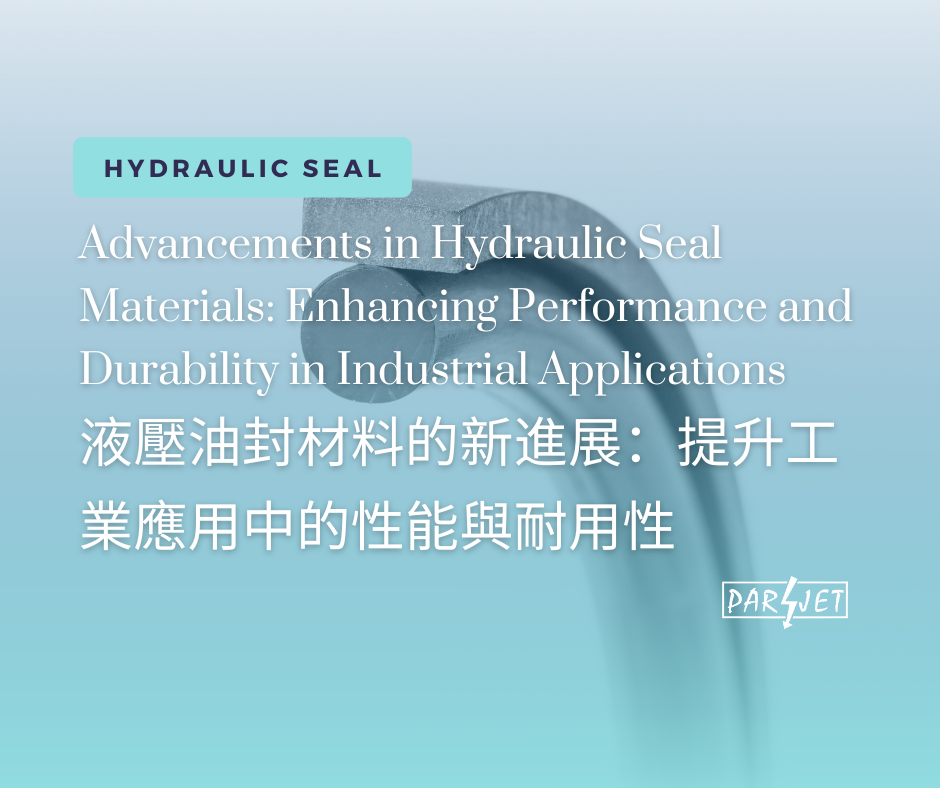
Advancements in Hydraulic Seal Materials: Enhancing Performance and Durability in Industrial Applications
Hydraulic seals serve an essential function in industrial machinery, preventing fluid leakage, maintaining pressure, and ensuring smooth operation. As industries demand higher efficiency, longevity, and resistance to extreme conditions, advancements in hydraulic seal materials have become fundamental.
From high-pressure hydraulic systems in construction and mining to corrosive environments in chemical processing, the right hydraulic seal material can prolong equipment lifespan, reduce downtime, and optimize performance.
We will explore the latest developments in hydraulic seal materials, their advantages, and how Parjet’s advanced sealing solutions are revolutionizing industrial applications.
1. The Importance of Material Selection in Hydraulic Seals
Choosing the correct hydraulic seal material is vital to:
• Prevent seal degradation under high pressure & temperature
• Enhance wear resistance for extended lifespan
• Improve chemical compatibility for aggressive fluids
• Reduce friction to minimize energy consumption
• Maintain flexibility in extreme operating conditions
The wrong material choice can lead to premature failure, leakage, and costly maintenance.
2. Key Advancements in Hydraulic Seal Materials
A. PTFE (Polytetrafluoroethylene) Hydraulic Seals
• High chemical resistance against aggressive fluids
• Low friction, reducing wear and energy loss
• Performs in extreme temperatures (-200°C to 260°C)
• Used in high-speed and high-pressure applications
Industries Using PTFE Hydraulic Seals:
• Aerospace – Landing gear systems
• Oil & Gas – High-pressure valves
• Food & Beverage – FDA-compliant sealing solutions
B. Polyurethane (PU) Seals
• Excellent abrasion resistance, making them ideal for heavy-duty equipment
• Superior elasticity, allowing flexibility under dynamic conditions
• Performs well in moderate temperature ranges (-30°C to 100°C)
Best Applications for PU Seals:
• Hydraulic cylinders in construction machinery
• Mobile hydraulic systems (excavators, forklifts)
• Seals for marine and offshore environments
C. Nitrile Rubber (NBR) Seals
• Affordable and widely used in general hydraulic applications
• Good oil and fuel resistance
• Performs in moderate temperatures (-30°C to 120°C)
Common Uses:
• Automotive hydraulic systems
• General industrial equipment
• Hydraulic pumps and compressors
D. Fluoroelastomer (FKM/Viton®) Seals
• Outstanding high-temperature resistance (up to 200°C)
• Excellent chemical resistance to aggressive fluids
• Low gas permeability, making it ideal for vacuum applications
Industries Using FKM Seals:
• Aerospace & Defense
• High-speed hydraulic applications
• Chemical and pharmaceutical processing
E. Spring-Energized Seals (SES) for Extreme Applications
• Backed by metal springs (cantilever, helical, or canted coil) for constant sealing force
• Ideal for ultra-high pressure (above 300 bar)
• Withstands extreme temperatures (-250°C to 300°C)
Best for:
• Cryogenic applications (LNG transport, space systems)
• Oil drilling and offshore industries
• Medical devices requiring ultra-pure sealing
3. How Advanced Hydraulic Seal Materials Solve Common Industrial Challenges
A. Hydraulic Seal Failure Prevention
• High-performance materials like PTFE & FKM reduce thermal degradation
• Polyurethane offers superior abrasion resistance for heavy-duty machinery
• Spring-energized seals maintain sealing force under extreme conditions
• Related Article: 5 Common Causes of Hydraulic Seal Failure and Ways to Prevent
B. Enhancing Durability in Marine & Offshore Equipment
• Saltwater-resistant polyurethane and PTFE extend service life
• FKM & PTFE withstand oil spills, harsh weather, and high-pressure conditions
• Related Article: The Top 3 Benefits of Hydraulic Seals in Marine and Offshore Equipment
C. Customization for Unique Industrial Needs
• Custom hydraulic sealing solutions ensure perfect material selection
• Parjet offers tailored solutions for extreme temperatures, pressures, and speeds
• Related Article: What Are the 3 Benefits of Choosing Custom Hydraulic Sealing Solutions?
4. Why Choose Parjet’s Advanced Hydraulic Seal Solutions?
• Industry-Leading Expertise: Over 30 years in hydraulic sealing innovation
• High-Performance Materials: PTFE, PU, FKM, and Spring-Energized Seals
• Custom Engineering Support: Tailored sealing solutions for oil & gas, aerospace, automotive, and more
• Compliance with Industry Standards: ISO-certified materials for reliability and safety
• Related Article: Custom Hydraulic Seals: Tailoring Solutions with Manufacturers
The Future of Hydraulic Sealing Technology
The latest advancements in hydraulic seal materials have significantly improved performance, durability, and resistance to extreme conditions. As industries demand more efficient and long-lasting sealing solutions, selecting the right material is crucial for maximizing equipment lifespan and minimizing maintenance costs.
At Parjet, we are committed to providing high-performance hydraulic seals tailored to your industry needs. Whether you need PTFE for chemical resistance, polyurethane for heavy-duty durability, or spring-energized seals for ultra-high pressure, our expert engineering team can help you find the perfect solution.
Contact Parjet today to explore our latest hydraulic sealing technologies!





